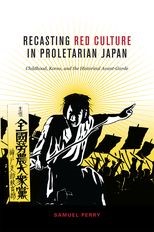Recasting Red Culture in Proletarian Japan: Childhood, Korea, and the Historical Avant-Garde
Recasting Red Culture in Proletarian Japan: Childhood, Korea, and the Historical Avant-Garde
Cite
Abstract
This book turns a critical eye on the influential proletarian cultural movement that flourished in 1920s and 1930s Japan. This was a diverse, cosmopolitan, and highly contested moment in Japanese history when notions of political egalitarianism were being translated into cultural practices specific to the Japanese experience. The book offers an account of the passions—and antinomies—that animated one of the most admirable intellectual and cultural movements of Japan's twentieth century, and argues that proletarian literature, cultural workers, and institutions fundamentally enrich our understanding of Japanese culture. What sustained the proletarian movement's faith in the idea that art and literature were indispensable to the task of revolution? How did the movement manage to enlist artists, teachers, and scientist into its ranks, and what sorts of contradictions arose in the merging of working-class and bourgeois cultures? The book asks these and other questions as it historicizes proletarian Japan at the intersection of bourgeois aesthetics, radical politics, and a flourishing modern print culture. The book details how cultural activists “recast” forms of modern culture into practices commensurate with the goals of revolution. It offers a new approach to studying revolutionary culture. By examining the margins of the proletarian cultural movement, the book redefines its center as it historicizes proletarian children's culture, avant-garde “wall fiction,” and a literature that bears witness to Japan's fraught relationship with its Korean colony. Along the way, the book shows how proletarian culture opened up new critical spaces in the intersections of class, popular culture, childhood, gender, and ethnicity.
-
Front Matter
- 1 Introduction: Recasting Red Culture in Proletarian Japan
-
2
Fairy Tales on the Front Line: Reading Childhood, Class, and Culture
-
3
Writing on the Wall: Kabe Shōsetsu and the Proletarian Avant-Garde
-
4
Comrades-in-Arms: Zainichi Communists, Revolutionary Local Color, and the Antinomies of Colonial Representation
-
End Matter
Sign in
Personal account
- Sign in with email/username & password
- Get email alerts
- Save searches
- Purchase content
- Activate your purchase/trial code
Institutional access
-
Sign in through your institution
- Sign in with a library card Sign in with username/password Recommend to your librarian
Institutional account management
Sign in as administratorPurchase
Our books are available by subscription or purchase to libraries and institutions.
Purchasing information| Month: | Total Views: |
|---|---|
| November 2022 | 5 |
| November 2022 | 4 |
| November 2022 | 4 |
| November 2022 | 4 |
| December 2022 | 1 |
| January 2023 | 3 |
| January 2023 | 2 |
| January 2023 | 2 |
| January 2023 | 2 |
| March 2023 | 1 |
| August 2023 | 3 |
| December 2023 | 2 |
| December 2023 | 1 |
| January 2024 | 1 |
| April 2024 | 1 |



Get help with access
Institutional access
Access to content on Oxford Academic is often provided through institutional subscriptions and purchases. If you are a member of an institution with an active account, you may be able to access content in one of the following ways:
IP based access
Typically, access is provided across an institutional network to a range of IP addresses. This authentication occurs automatically, and it is not possible to sign out of an IP authenticated account.
Sign in through your institution
Choose this option to get remote access when outside your institution. Shibboleth/Open Athens technology is used to provide single sign-on between your institution’s website and Oxford Academic.
If your institution is not listed or you cannot sign in to your institution’s website, please contact your librarian or administrator.
Sign in with a library card
Enter your library card number to sign in. If you cannot sign in, please contact your librarian.
Society Members
Society member access to a journal is achieved in one of the following ways:
Sign in through society site
Many societies offer single sign-on between the society website and Oxford Academic. If you see ‘Sign in through society site’ in the sign in pane within a journal:
If you do not have a society account or have forgotten your username or password, please contact your society.
Sign in using a personal account
Some societies use Oxford Academic personal accounts to provide access to their members. See below.
Personal account
A personal account can be used to get email alerts, save searches, purchase content, and activate subscriptions.
Some societies use Oxford Academic personal accounts to provide access to their members.
Viewing your signed in accounts
Click the account icon in the top right to:
Signed in but can't access content
Oxford Academic is home to a wide variety of products. The institutional subscription may not cover the content that you are trying to access. If you believe you should have access to that content, please contact your librarian.
Institutional account management
For librarians and administrators, your personal account also provides access to institutional account management. Here you will find options to view and activate subscriptions, manage institutional settings and access options, access usage statistics, and more.